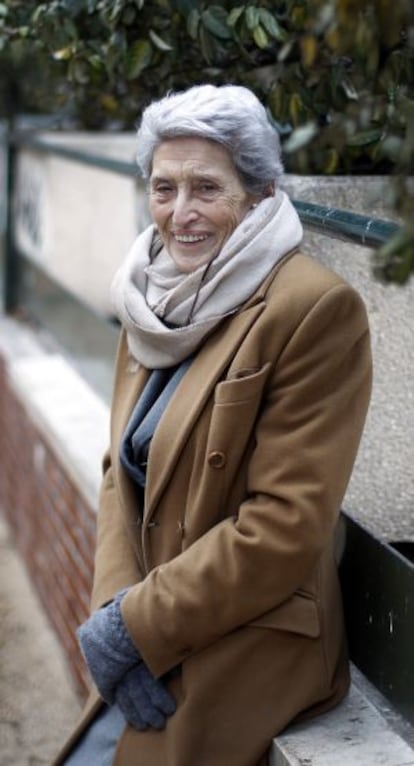"We journalists have become lazier with the internet"
Veteran reporter Pura Ramos is still gathering in the news, at 80

"I killed Kennedy and his brother, I killed two popes, I went through the war of Dien Bien Phu, I killed Carrero Blanco and Franco..." Pura Ramos is not a serial killer; she is just rattling off in newspaper jargon all the news stories that she has covered throughout her nearly 60-year career.
Now 80, this veteran journalist is still out there getting the news. "I always say to myself, 'I'll quit this Christmas... no, this Easter... no, this summer.' I'm incapable of making that small leap. I like my profession so much that it's really hard for me to quit!"
And there she is, her curiosity still intact, living out the advice she heard from Ramón Menéndez Pidal: "Put your heart and soul into whatever you do." And she does so to such an extent that she forgets to eat her croissant while her coffee grows cold in front of her. And she did so to such an extent in the past that she never stopped working, even when she got married to fellow journalist Jesús de la Serna and the children started coming: one, two, up to eight of them, at a time when nobody even talked about work-family programs.
"My life was spread out between my work, my children and my house. I'd fall asleep anywhere I happened to be sitting down," recalls this woman, who on more than one occasion went straight "from the newsroom to the delivery room." She nursed her first-born at Pueblo, the newspaper she set foot in for the first time on December 13, 1952 as a student of the Official Journalism School. After working at Informaciones (run by her husband between 1968 and 1978) and Nuevo Lunes, she was made the press officer at the Prado Museum - "I would step out of the office and walk into Las meninas."
These days, this expert in international affairs and cultural reporting works as a writer for the art publication Ars Magazine. "The director introduces me like this: 'Pura Ramos, the institution'. And I immediately think about the Telefónica building on Gran Vía," she laughs.
Ramos neither feels like an institution nor thinks that her role as a pioneering woman journalist was all that important. "There's no merit in it. All I did was be born before the others," she says.
"I often get asked whether I felt discriminated against, but that was the way the world was back then. You couldn't even understand the concept of discrimination, and it didn't occur to you that you might be able to break a rule. The world was the way it was, and you didn't question the order of things. I didn't realize that I was an exception," she recalls.
But Ramos, a Basque who was born in Madrid in 1931 - "We Basques are born wherever we please," she jokes - did break with the norm. "Things happen and you just deal with them," she concludes.
Ramos says that journalism has given her a sense of curiosity and of being alive. And when a big news story breaks, she still wants to be there.
"I don't know whether journalism is better or worse now, but it is different," she notes. "We've become lazier with the internet and social networks. We wait for the story to come to us. The instinct has been lost." Back when she started, there were not even press conferences. "You had to go out and get the news."
Tu suscripción se está usando en otro dispositivo
¿Quieres añadir otro usuario a tu suscripción?
Si continúas leyendo en este dispositivo, no se podrá leer en el otro.
FlechaTu suscripción se está usando en otro dispositivo y solo puedes acceder a EL PAÍS desde un dispositivo a la vez.
Si quieres compartir tu cuenta, cambia tu suscripción a la modalidad Premium, así podrás añadir otro usuario. Cada uno accederá con su propia cuenta de email, lo que os permitirá personalizar vuestra experiencia en EL PAÍS.
¿Tienes una suscripción de empresa? Accede aquí para contratar más cuentas.
En el caso de no saber quién está usando tu cuenta, te recomendamos cambiar tu contraseña aquí.
Si decides continuar compartiendo tu cuenta, este mensaje se mostrará en tu dispositivo y en el de la otra persona que está usando tu cuenta de forma indefinida, afectando a tu experiencia de lectura. Puedes consultar aquí los términos y condiciones de la suscripción digital.








































